7A-unit2-最新广州、深圳沪教版牛津英语七年级上册教案
(完整版)沪教牛津版初中英语七年级上册全套教学案
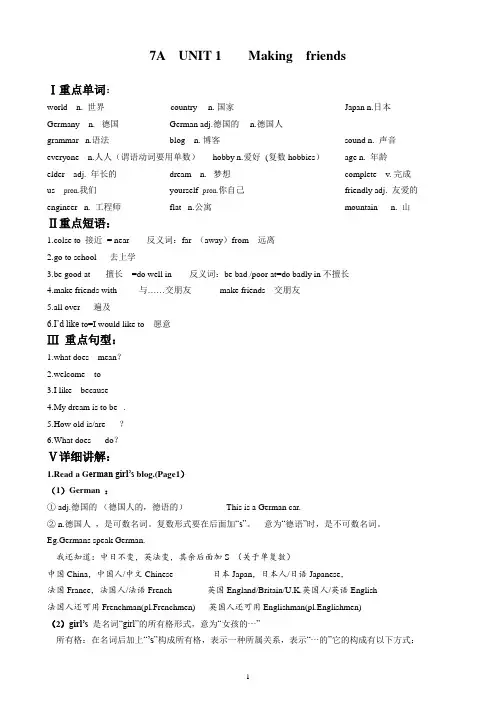
7A UNIT 1 Making friendsⅠ重点单词:world n. 世界country n. 国家Japan n.日本Germany n. 德国German adj.德国的n.德国人grammar n.语法 blog n. 博客sound n. 声音everyone n.人人(谓语动词要用单数)hobby n.爱好(复数hobbies)age n. 年龄elder adj. 年长的dream n. 梦想complete v. 完成us pron.我们 yourself pron.你自己friendly adj. 友爱的engineer n. 工程师 flat n.公寓mountain n. 山Ⅱ重点短语:1.colse to 接近 = near 反义词:far (away)from 远离2.go to school 去上学3.be good at 擅长 =do well in 反义词:be bad /poor at=do badly in不擅长4.make friends with 与……交朋友 make friends 交朋友5.all over 遍及6.I’d like to=I would like to 愿意Ⅲ重点句型:1.what does···mean?2.welcome to3.I like···because···4.My dream is to be··.5.How old is/are ····?6.What does ····do?Ⅴ详细讲解:1.Read a G erman girl’s blog.(Page1)(1)German :① adj.德国的(德国人的,德语的)This is a German car.② n.德国人,是可数名词。
沪教牛津版 7AU1-2 Listening and speaking教案
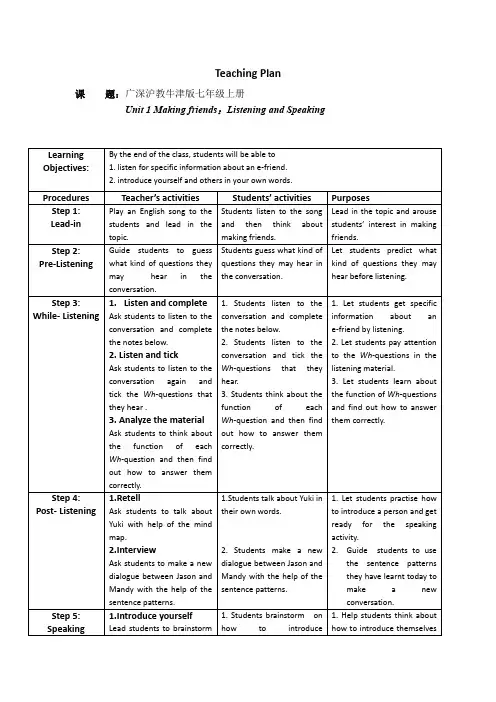
课题:广深沪教牛津版七年级上册
Unit1Makingfriends:ListeningandSpeaking
Learning Objectives:
By the end of the class, students will be able to
1.listenfor specificinformationabout an e-friend.
Studentslisten to the song andthenthink about making friends.
Lead in the topic and arouse students’ interestinmaking friends.
Step2:
Pre-Listening
Guidestudents toguesswhat kind of questions they may hear in the conversation.
Step4:
Post-Listening
1.Retelh help of the mind map.
2.Interview
Ask students to make a new dialoguebetween Jason and Mandywith the help of the sentence patterns.
1.Studentstalk about Yuki in their own words.
2. Studentsmake a new dialogue between Jason and Mandywith the help of the sentence patterns.
1.Let students practisehow to introduce a personand get ready for thespeakingactivity.
unit 2同步教案2021-2022学年上海牛津版七年级上册英语
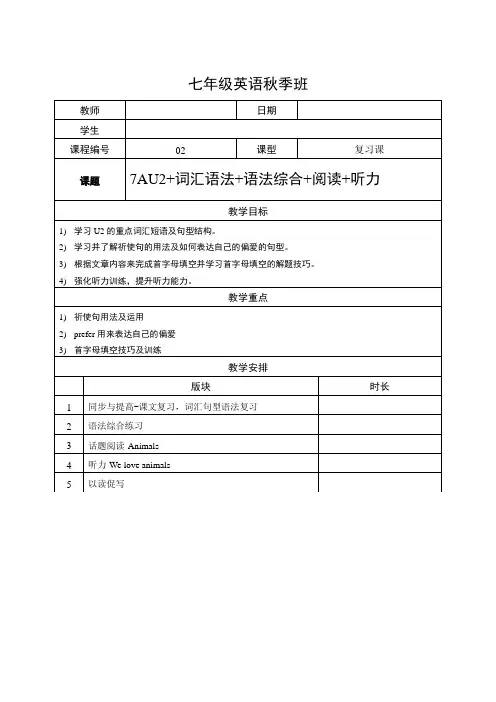
七年级英语秋季班1. 7A U2同步与提高Part 1 课文ReviewAnimals, our friendsThe SPCA is an organization which helps protect animals. Every year, it s_____1_____ a lot of animals in Garden City. Sometimes people are u_____2_____ to their pets. They don’t take c_____3_____ of their pets and leave them in the street. SPCA o_____4_____ save them from danger and take them to the SPCA.The SPCA a_____5_____ helps animals find new homes. If people want to _____6_____ a pet, they can go to the SPCA. H_____7_____, they must promise to look after their new pet.There are clinics for those animals who are s_____8_____ in the SPCA. The vets in the clinics take care of them.Part 2 根据音标写单词7A U2 Vocabulary(牛津)序号英文音标词性中文1 ['ɒfɪsə] n. 官员;高级官员2 [sə'saɪətɪ] n. 社团;协会3 [prɪ'venʃn] n. 预防;防止;防范4 ['krʊəltɪ] n. 残酷5 ['sʌmwʌn] pron. 某人6 ['pʌpɪ] n. 小狗;幼犬7 ['θɜːstɪ] adj. 口渴的8 ['lʌvlɪ] adj. 可爱的;有吸引力的9 [æz] prep. 作为;当作10 [prɪ'fɜː]v. 更喜欢11 [keə] n. 照料;照顾Part 3 词汇语法复习Grammar2. 祈使句一、定义:祈使句是用来表示请求、命令、劝说、号召、警告等的句子。
上海牛津版英语七年级上册七上7AUnit2U2同步讲义教案
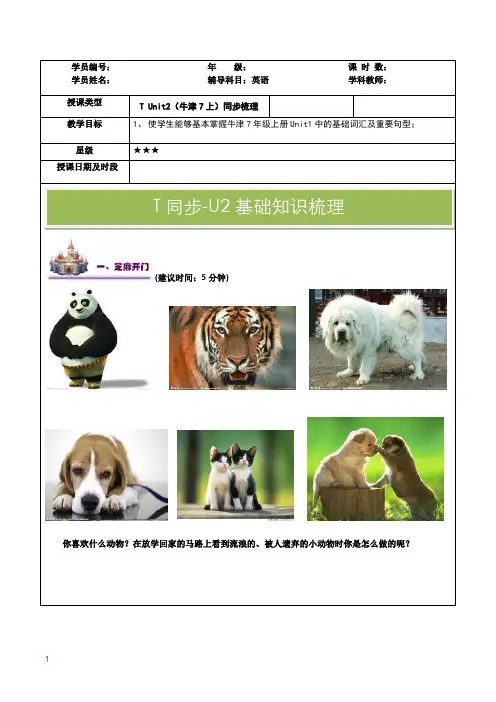
学员编号:年级:课时数:学员姓名:辅导科目:英语学科教师:授课类型T Unit2(牛津7上)同步梳理教学目标1、使学生能够基本掌握牛津7年级上册Unit1中的基础词汇及重要句型;星级★★★授课日期及时段T同步-U2基础知识梳理(建议时间:5分钟)你喜欢什么动物?在放学回家的马路上看到流浪的、被人遗弃的小动物时你是怎么做的呢?一、词汇Words (建议20分钟,老师边讲边要求学员记住单词,此环节结束之后要求学员记住80%)1. officer n. 官员;高级官员【词性转换】office n. 办公室e.g. A police officer came to help when our car broke down on the way.我们的汽车在路上出了毛病,一位警官帮了我们的忙。
2. society n. 社团;协会【词性转换】social adj. 协会的;社会的e.g. the Chemical Society of China 中国化学学会3. prevention n. 预防;防止;防范【词性转换】prevent v. 预防;防止e.g. Prevention is better than cure. 预防胜于治疗。
批注:prevent和protect,很多孩子分辨不清楚,还应该让孩子注意protect的名词形式是protection。
4. cruelty n.残酷【词性转换】cruel adj. 残酷的;悲惨的e.g. cruelty to children 虐待儿童5.someone pron. 某人【近义词】somebody pron. 某人;有人e.g. Someone wants to talk with you. 有人想和你谈话。
6. puppy n. 小狗;幼犬【提示】dog一般用来指“成年狗”或表示狗的总称;puppy特指小狗,复数形式为puppies7. thirsty adj. 口渴的【词性转换】thirst n. 口渴e.g. I often feel thirsty when it’s very hot. 天热时,我常感到口渴。
Unit2教学设计2023-2024学年牛津上海版英语七年级上册
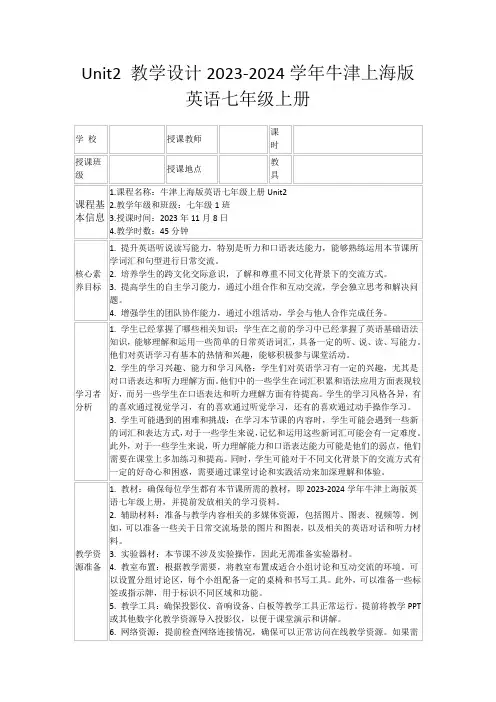
反思改进措施
在刚刚结束的《Unit2教学设计2023-2024学年牛津上海版英语七年级上册》的课程中,我尝试了许多新的教学方法和策略,希望能够激发学生的学习兴趣并提高他们的英语水平。现在,我将对我的教学进行反思,并提出一些改进措施。
首先,我认为本节课的最大特色是引入了大量的实际生活中的场景和例句,让学生能够更好地理解和应用所学的词汇和句型。我也尝试了分组讨论和角色扮演等多种教学方法,让学生能够在实践中提高他们的英语能力。此外,我也利用了多媒体教学资源,如PPT和视频,来辅助我的教学,希望能够增加学生的学习兴趣。
然而,我也发现了一些主要问题。首先是教学管理方面,我发现有些学生在小组讨论和角色扮演时注意力不集中,这可能是因为他们对这些活动不感兴趣或者缺乏参与感。其次,在教学方法上,我发现对于一些学生来说,过多的听力和口语练习可能会造成他们的疲劳和压力,他们可能更需要一些时间和空间来消化和理解所学的知识。最后,在教学评价上,我意识到仅仅依靠课堂表现和作业完成情况来评价学生的学习成果是不够的,我需要找到更全面和准确的评价方法来了解学生的真实学习情况。
二、新课讲授(用时10分钟)
1.理论介绍:首先,我们要了解本节课的主要内容——日常英语交流的基本句型和词汇。这些句型和词汇是英语交流的基础,它们可以帮助我们更好地表达自己的想法和需求。
2.案例分析:接下来,我们来看一个具体的案例。这个案例展示了如何在实际场景中运用所学句型和词汇进行交流,以及它如何帮助我们更有效地沟通。
针对以上的反思,我将采取以下改进措施。首先,在教学管理方面,我将尝试更多的方法来提高学生的参与感和注意力,比如通过小组竞赛或者角色扮演的游戏等方式。其次,在教学方法上,我将更加注重学生的个体差异,根据他们的学习需求和风格来调整我的教学方法和节奏。最后,在教学评价上,我将采取更多的评价方式,如学生自我评价、同伴评价和定期考试等,来全面了解学生的学习成果。
牛津上海版七年级英语上册教学设计:Unit2Ouranimalfriends
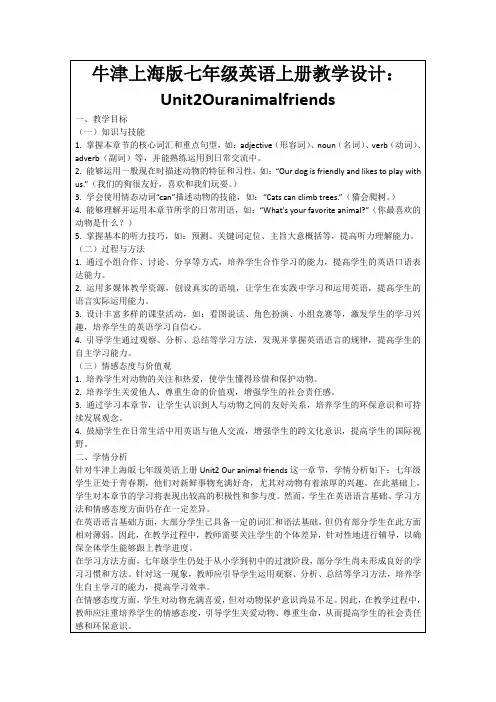
4.布置课后作业,如让学生写一篇关于自己最喜欢的动物的小短文,巩固课堂所学知识,培养学生的写作能力。
五、作业布置
为了巩固本章节所学知识,培养学生的语言实际运用能力,特布置以下作业:
1.请学生根据自己的喜好,选择一种动物,运用本节课所学的词汇和句型,写一篇关于该动物的小短文。要求描述动物的外貌、特点、习性和技能,不少于80词。
d.鼓励学生课后参加与动物相关的实践活动,如参观动物园、做动物保护志愿者等,将所学知识与社会实践相结合。
四、教学内容与过程
(一)导入新课(500字)
1.教师以生动有趣的故事引入新课,例如:“Once upon a time, there was a clever dog named Biscuit. He could do many interesting things, such as fetching a ball, shaking hands, and even dancing. Today, we are going to learn about our animal friends and their amazing skills.”(从前,有一只聪明的狗叫饼干。它会做很多有趣的事情,比如捡球、握手,甚至跳舞。今天,我们将要学习关于我们的动物朋友和它们的神奇技能。)
4.鼓励学生在日常生活中用英语与他人交流,增强学生的跨文化意识,提高学生的国际视野。
二、学情分析
针对牛津上海版七年级英语上册Unit2 Our animal friends这一章节,学情分析如下:七年级学生正处于青春期,他们对新鲜事物充满好奇,尤其对动物有着浓厚的兴趣。在此基础上,学生对本章节的学习将表现出较高的积极性和参与度。然而,学生在英语语言基础、学习方法和情感态度方面仍存在一定差异。
沪教牛津版广州英语七年级的上册Unit2讲义
英语初一专题系列之Unit 2 Daily life1. between and _________________________2. 把某物送给某人 ________________________3. once or twice a week_________________________4. on foot _________________________5. 过得快乐 _________________________6. 下学后 _________________________7. 教某人做某事 _________________________ 8. in the middle of _________________________ 9. 参加 _________________________ 10. by doing sth _________________________ 11. How often _________________________ 12. junior high school _________________________ 13 乘公共汽车 _________________________ 14. 在末端 _________________________15 起床 _________________________ 16. play the piano _________________________1. Listen to a boy talking about his weekend.【考点聚焦】Talk about 意为“___________”,后边既能够接人 , 也能够接物。
Let’s talk about the problem.The students are talking about the new teacher.2.辨析 That ’ s right. All right 与 That ’ s allright [考点聚焦 ]①That ’s right___________。
最新广州、深圳沪教版牛津英语七年级上册教案一至三单元
7A UNIT 1 Making friendsⅠ重点单词:World n. 世界country n. 国家Japan n.日本Germany n. 德国German adj.德国的n.德国人Everyone n。
人人(谓语动词要用单数) Us pron。
我们yourself pron.你自己age n. 年龄elder adj. 年长的friendly adj。
友爱的Hobby n.爱好(复数hobbies) dream n。
梦想complete v. 完成grammar n.语法blog n。
博客sound n。
声音engineer n。
工程师flat n。
公寓mountain n. 山Ⅱ重点短语:1。
colse to 接近 = near 反义词:far (away)from 远离2.Go to school 去上学3。
Be good at 擅长 =do well in 反义词:be bad /poor at=do badly in不擅长4。
Make friends with 与……交朋友 make friends 交朋友5。
All over 遍及6。
I’d like to=would like to 愿意Ⅲ重点句型:1.what does···mean?2.welcome to3.I like···because···4.My dream is to be··?5.How old is/are ····?6.What does ····do?详细讲解:1.Read a German girl’s blog。
(Page1)(1)German :①adj。
德国的 (德国人的,德语的)This is a German car。
沪教牛津版广州英语七年级上册Unit2讲义(精品资料).doc
【最新整理,下载后即可编辑】英语初一专题系列之Unit 2 Daily life1. between…and… _________________________2. 把某物送给某人________________________3. once or twice a week_________________________4. on foot_________________________5. 过得愉快_________________________6. 放学后_________________________7. 教某人做某事_________________________ 8. in the middle of _________________________9. 参加_________________________ 10. by doing sth_________________________11. How often _________________________ 12. junior high school _________________________13乘公共汽车_________________________ 14. 在…末尾_________________________15起床_________________________ 16. play the piano_________________________1. Listen to a boy talking about his weekend.【考点聚焦】Talk about意为“___________”,后面既可以接人, 也可以接物。
Let’s talk about the problem.The students are talking about the new teacher.2. 辨析That’s right. All right与That’s all right[考点聚焦]①That’s right ___________。
最新牛津上海版英语七年级上册《unit 2 at the airport》教案.doc
Module 1 Garden City and its neighboursUnit 2: At the airport (I)Language focus:Using nouns / noun phrases to identify objects.Using prepositions to indicate a period of time.Using the present perfect tense to relate past events to the present. Using adjectives to express quantities.网]Using adverbs to express degree.[I. Warming-up:II. Pre-task preparation:1. Put the map of USA on the board. Ask students: Where is Los Angeles?2. Bring some photos or pictures of interesting places in Los Angeles to class. Circulate around the class to let students have a rough idea what Los Angeles looks like3. Introduce the new vocabulary items in Look and learn.4. Review quantifiers: Use real objects to review a lot of, many, plenty of, several, some, a small amount of, a fe w5. Remind students of the use of the present perfect tense in the passage. Go over the verbs in the present perfect tense with stu dents. Invite the more able students to speak out and spell, if possible, the corresponding verbs in their present tense form.6. Tell students that the use if the prepositional phrase: for (___)_days / weeks / months / years is used to indicate a period of time. Invite some students to answer questions, like this: How long have you studied in this school? How long have you learnt English? to elicit: I have studied in this school for ... / I have learnt English for ...7. Play the recording: Look and learn and Look and read. Students listen and follow in their books.8. Play the recording again. Students listen and repeat.9. Students read the text individually and write down the answers to the questions in Answer true / false. Check the answers with the whole class. Invite the more able students to review the false statements into true ones on the board.III. Consolidation:Grammar Practice Book 7A page 4.Unit 2: At the airport (II)Language focus:Using “going to” to describe events that will occur quite soon.Asking “Wh-” questions to find out time.Using prepositions to indicate time.Asking “How” questions to find out the length of a period of time.Using prepositions to indicate a period of time.I. Warming-up.II. Pre-task preparation:1. Introduce new vocabulary items: departure and arrival. Make sure students can differentiate between the two. Also make sure students can differentiate between a.m. and p.m.2. Look, read and think.3. Play the recording again. Students listen and repeat.4. Invite three students to come to the front and role-play the conversation. Ask a more able student to act as Mr. Li in order to work out the time for leaving home. Encourage other students to supply any different answers.5. Ask students to read page 7 of the Student's Book again. They are required to write and draw the time. Students then help each other check answers in pairs.6. Have students work in pairs to read the dialogue in Ask and answer. Walk around and offer help and guidance to the less able students if necessary.III. While-task procedure:Draw the air tickets on the board and invite some volunteers to write the answers on the air tickets.IV. Post-task activity:Distribute a piece of drawing paper to each s tudent. Tell them to think about where they would like to spend a holiday and to draw their own air tickets with the relevant information. Collect the students' work and bind it into a booklet to be circulated in class.V. Consolidation: Grammar Practice Book 7A page 5.Unit 2: At the airport (III)Language focus:Using imperatives to give instructions and directions.Using nouns to identify objects.I. Warming-up:II. Pre-task preparatio1. Introduce new vocabulary items: trolleys and escalators. Put an enlarged photocopy of pictures of trolleys on the board. Point to the pictures and say: trolleys. Then put an enlarged photocopy of pic tures of escalators on the board. Point to the pictures and say: escalators. Make sure students know the correct pronunciation of the vocabulary items.2. Review / Introduce: exit and entrance. Make sure students can differentiate between the two.3. Have students look at the eight signs and read the eight descriptions in Read and match carefully. Then ask them to match each sign with the suitable description. Finally, the whole class checks answers together. Ask students to point to the signs and read the descriptions aloud.III. While-task procedure:1. Draw the eight signs on the board and invite volunteers to come forward and write the descriptions under the signs.2. Tell students to imagine that they are at the airport. Ask them to think of three more signs that they can see at the airport. Tell them to draw the signs and write theIV. Post-task activity:Ask students to draw the signs that can be seen at restaurants, shopping centres, supermarkets, cinemas, swimming pools and on underground, buses, ferries, planes, etc.Unit 2: At the airport (IV)Language focus:[Using nouns / noun phrases to identify objects.Using the present perfect tense to relate past events to the present. Using adverbs to express time.I. Warming-up:II. Pre-task preparation:1. Review and introduce new vocabulary items in Look and learn. You may explain the meanings of these vocabulary items with real objects or pictures.Read the words aloud. Have students repeat after you2. Look and learn and Say and act.3. Play the recording again. Students listen and repeat.4. Students practise in groups the target language in Say and act by role-playing Mr. Li, Mrs Li and Grandma. Invite a few groups to come out and role-play the conversation in class.5. Have students work in pairs to talk about the checklist in Think and write. Have them complete the checklist by writing down what they have discussed with their partners.III. While-task procedure:1. Students discuss and agree on five items for a checklist before leaving for Los Angeles. Have them complete the checklist by writing down what they have discussed with their partners2. Still in pairs, students read the dialogues on page 9 of the Student's Book again. Students have to write some dialogues and role-play with their partners. They are required to use the target language learned in Say and act.3. Ask for volunteers to act out the conversations.IV. Post-task activity:Workbook pages 3 and 4.V. ConsolidationGrammar Practice Book 7A pages 6 and 8.。
- 1、下载文档前请自行甄别文档内容的完整性,平台不提供额外的编辑、内容补充、找答案等附加服务。
- 2、"仅部分预览"的文档,不可在线预览部分如存在完整性等问题,可反馈申请退款(可完整预览的文档不适用该条件!)。
- 3、如文档侵犯您的权益,请联系客服反馈,我们会尽快为您处理(人工客服工作时间:9:00-18:30)。
7A UNIT 2 Daily life重点单词:daily 每天的article 文章never从不break n. 休息v.打破打碎usually经常so因此bell 铃声ring 打电话,戒指seldom很少ride,骑,乘guitar,吉他band乐队,传送带together,一起grade年级Geography n. 地理;地形market,市场practice, 不可数名词,练习v.练习常考短语:junior high school 初中senior high school 高中primary school 小学on foot 步行take part in 参加go to bed睡觉get up起床have a good/great/wonderful time =enjoy oneself =have fun 玩得开心,愉快。
经典句型:1.How do /does... go to school?2.How long is...3.I alway have a good time...4.Is...close to...?5.Once a month ,I...6.How often do you...?7.They think ...as...详细讲解:1.Listen to a boy talking about his weekend.Listen ①不及物动词Listen!The boy is singing.②若要加宾语,要加“to”. 如:Pleasen listen to the teacher.Listen for 留心听2.辨析That’s right .All right与That’s all right①That’s right 对的,正确的。
(对别人所说的话表示肯定)②All right 好吧;身体康复了;令人满意的③That’s all right 不用谢;没关系(客气话和道歉的回应)3.Which of these things do you do once or twice a week?(page16)①助动词do/does/did后面要跟动词原形;②once or twice a week每周一两次注意:在英语中,表示一次用“once”,两次用“twice”,表示三次或者三次以上就用“基数词+times”(time在这里是可数名词,表示次数,需要加“s”)如:once a week, twice a week, three(four/ five…)times a week4. brush one’s teeth刷牙(page16)Brush①在这里是动词,表示“刷”②n.可数名词,“刷子”复数形式是“brushes”。
如:I need some brushes for paiting. Tooth的复数形式是“teeth”牙齿(因为每个人刷牙的时候不止刷一颗牙齿,所以要用复数)5.how often do you watch television(page 23)①how often 多久一次,询问动作发生的频率(上节学过的特殊疑问句,现在再来复习)how often 多久一次回答:once a week;three times a month how soon 多久以后回答:in an hour;in two weekshow long 多长时间回答:three days;four weeks②watch television= watch TV 看电视辨析watch、look、see、readwatch “观看、注视”,全神贯注地看看电视、比赛、实验、表演等Watch TV/game/matchlook “看、望”,指动作的过程,表示有意识地看,但不强调看的结果,后加介词“at”Look at 看look for寻找Look after 照顾see “看”,强调动作的结果,但不一定是有意识地看See a movie /doctorread 主要指看书、看报、看杂志Read newspaper 看报纸6.ride a bicycle 骑自行车(page 16)动词短语,交通工具前要加限定词(如a ,the)同义词:by bicycle/bike 介词短语,交通工具前不用加限定词7.My school is close to my home, so I always go to school on foot.(page17)①be close to 离……近= near =beside= not far away from(上节课学过)②home、family、house的区别home “家、住所”,指一个人(或一家人)居住的地方,也可指一个人出生或长大的地方(乡村、城市或国家等),它具有house所没有的感情色彩family 家庭、家庭成员”,与居住的房子无关。
当family作为整体概念的“家庭”讲时是单数;当“家庭成员”讲时是复数;house 指“家”时含义较窄,仅指“房屋”这一建筑物,一般指独门独户的房子,不指楼房。
③so在此处用作连词,表示结果“因此;所以”的意思。
不可以将because和so同在一个句子里。
(他们两个就像两只老虎,一山不能容二虎。
类似的还有although/ though和but。
)④go to school on foot= walk to school步行去学校go to…on foot = walk to …8.Classes start at 8 am, and I am seldom late.(page17)①Start 在这里是不及物动词,开始。
同义词:begin 反义词:end、finish还可以做及物动词,后加n./pren./to do/doingstart at: 几点开始②be late: 迟到be late for school ····迟到如:He gets up late in the morning,so he is often late for shcool.Later 副词。
后来,过后。
一段时间+later 如:He come back two days later。
③at 在这里表示时间,“在”如: at half past two 在两点半at (后+时间)在具体的钟点(后+地点)小地方用“at”at 8 am ;Arrive at schoolin (后+时间)指上午、下午或晚上;年月或季节(后+地点)大地方用“in”Inthe morningIn January ;in spring ;Arrive in Beijingon具体日期,在星期几前,在节日前,某天的上下午On May 2st;on MondayOn New Year’s Dayon the morning of May 2st注意:arrive+地点名词=reach /get to (但是后面是home、here、there则不需要加介词)9.I enjoy learning about different places in the world.(page17)①Different:不同的。
反义词:sameBe different from “与····不同”②enjoy doing sth= like/love doing sth. very much 喜欢做某事③learn about:获悉;了解10.We have our morning break at 9:50.a.m.(page17)Break n. 可数名词休息。
have /take a break=have /take a rest 休息一下V.动词。
打破,打碎。
Break the window 打破了窗户11.When the bell rings, I run to the playground with my best friends Tom and Jack.(page17)①when在这里不是表示询问时间,而是一个连词,表示“当···时候”,后面加一个句子。
此处连接两个先后发生的动作;也可表示两个动作同时发生。
②ring 是不及物动词,“打电话”n.电话,环形物(戒指)。
如:give sb. a ring给某人打个电话。
A magic ring 一枚魔戒12.How Short it is.(page17)这是一个由“how”引起的感叹句句型为:how+形容词/副词+主语+谓语(有时也可以省掉主谓语)What+a/an +形容词+单数可数名词+主语+谓语!What a kind man he is!What+形容词+不可数名词/复数名词+主语+谓语!What fine weather it is today!What beautiful flowers these are!13.Then Tom, Jack and I take part in the school band practice.(page17)take part in +n./动名词指参加会议、工作、游戏等,有积极的态度,并起到一定作用。
join 指加入某个党派,团体组织等,成为其成员之一,意为:“参军、入团、入党”等; 后面常出现club,army,team,group。
其结构为:join sb. in (doing) sth.join in 多指参加小规模的活动如“球赛、游戏”等,常用于日常口语attend 正式用语,指参加会议、婚礼、典礼;听报告、讲座等。
14.do morning exercisexercise是练习,一般用语,可指训练,锻炼,操练等①作可数名词用,“练习,习题,体操,功课,操练”等,常用复数。
I'm doing my exercises.我在做练习/功课。
②作不可数名词用,“锻炼,运动”。
Take more exercise,and you will be healthy.多多锻炼,你会健康的。
③作动词用,“训练,锻炼”。
You must exercise yourself in order to be stronger and healthier.为了更健康更强壮,你必须锻炼自己。
Grammar一、一般现在时(一)含义:表示经常性或习惯性的动作,或表示现在的特征或状态。
1.表示事物或人物的特征、状态。
如:The sky is blue.天空是蓝色的。
2.表示经常性或习惯性的动作。
